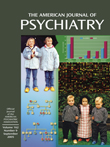To the Editor: In their article on sustained remission of schizophrenia in older outpatients, Dilip V. Jeste, M.D., and Lisa A. Auslander, Ph.D.
(1), matched 12 patients with sustained remission with 12 still-symptomatic schizophrenia patients and 12 normal comparison subjects. Their finding of no statistical differences on a composite measure of neurocognitive functioning between the schizophrenia patients who were or were not in sustained remission was viewed as an example of the persistence of neurocognitive deficits even in patients whose symptoms were low or nil. In their article, they did not specify the criteria used for defining sustained remission in terms of quantitative levels of symptoms, nor did they report the age-appropriate, psychosocial functional status of the patients, such as peer relations, independent recreational activities, employment or volunteer work, or the ability to live without supervision of finances and medication management. Because neurocognitive capacities are known to be much more related to psychosocial functioning than to symptoms, it is important to include personal functioning in studies relating neurocognition to good outcomes.
In a study using the same design, we matched 28 middle-aged schizophrenia patients who were in sustained remission and living independently for 2 years or more with 28 still-symptomatic schizophrenia patents and 28 normal comparison subjects. To meet our criteria for sustained remission, or recovery, we required the patients to score 4 or less on the Brief Psychiatric Rating Scale, to work or attend school at least half-time, to live independently (without supervision of their finances and medication management), and to have at least one social activity per week with a peer without professional involvement.
We found that neurocognitive performance on tests tapping executive functioning, verbal fluency, and verbal working memory was the same for the recovered schizophrenic patients and their matched normal comparison subjects and significantly better than that of the still-symptomatic patients
(2). The only cognitive functioning that remained significantly different between the recovered patients and the normal subjects was early visual processing, as measured by the Forced-Choice Span on Apprehension Test
(3), which is viewed as an enduring vulnerability or “trait marker” for schizophrenia.
Because the criteria for sustained remission and psychosocial functioning were not specified in the article by Drs. Auslander and Jeste, it was not possible to compare the results with our study strictly; however, it is worth pointing out that the article by Drs. Auslander and Jeste 1) collapsed their neurocognitive tests into a global index and 2) used statistical tests with a tiny sample to determine mean differences between the groups on neurocognitive, quality of life, and social functioning rather than evaluating differences between subsamples that achieved or did not achieve categorical definitions of symptomatic and functional recovery.
If Drs. Auslander and Jeste could assign specific criteria to their definitions of “sustained remission” or “psychosocial functioning,” it might be possible to determine how many of their small group actually achieved an operationalized construct of recovery that might reflect differences in neurocognition between recovered and nonrecovered patients. Identifying neurocognitive and other malleable predictors and correlates of optimal clinical improvement and recovery can contribute to a growing database that would be relevant for targeting treatment interventions with resultant improvements in services for persons with schizophrenia
(4).
We are delighted that other investigators have begun to develop criteria for recovery from schizophrenia and are conducting research on this elusive but much-desired outcome. We agree with Drs. Auslander and Jeste that patients with schizophrenia would have considerably greater opportunities for recovery if systems of care provided services that offered combined comprehensive, continuous, coordinated, compassionate, consumer-oriented, and evidence-based psychosocial rehabilitation.

